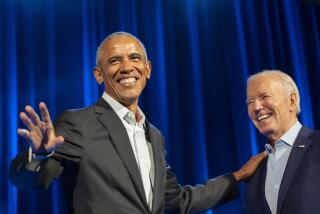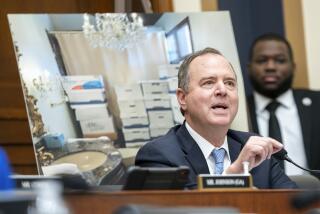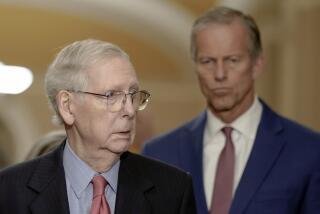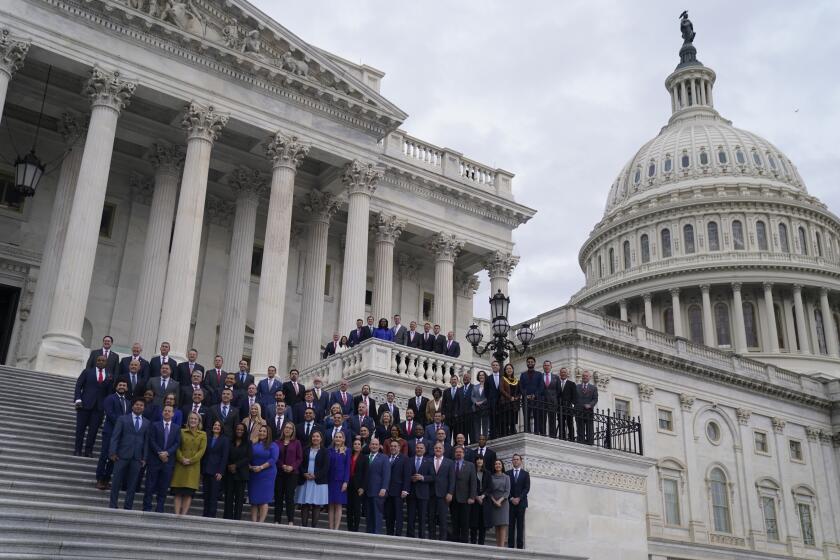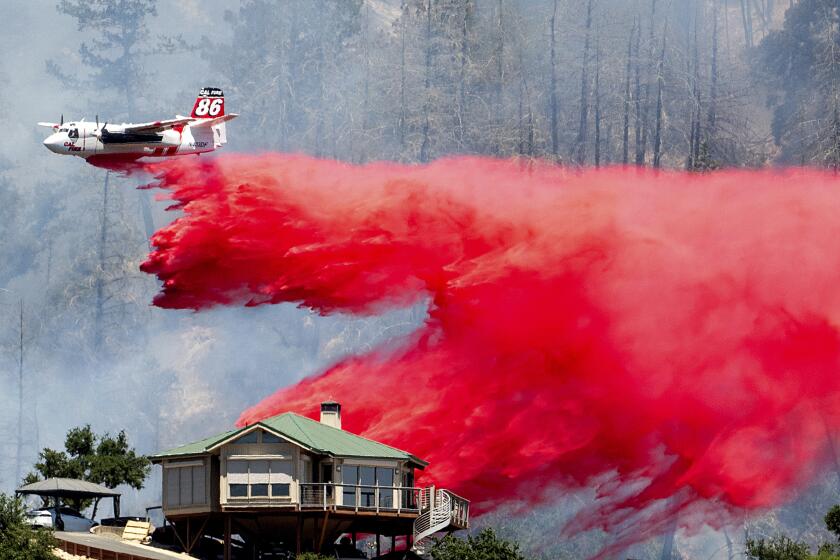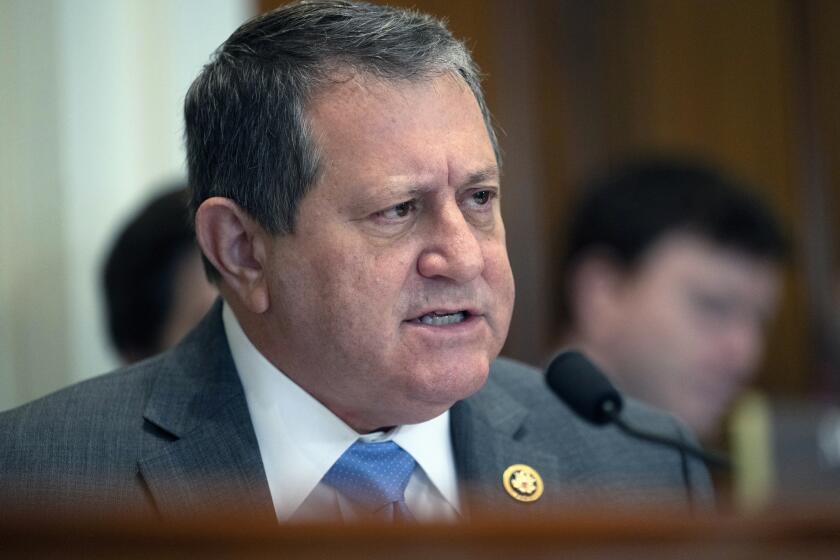Democrats Eagerly Flaunt Hallowed Totems of GOP : Campaign: From country singers to business backers, Clinton camp has appropriated key Republican symbols.
“They’re stealing our symbols,” one Republican operative cried after she learned that country singer Tammy Wynette had performed at the glittering fund-raiser last week for Bill Clinton in Beverly Hills.
If Republicans were disappointed to learn that one of their favorite cultural emblems was fraternizing with the enemy, they were positively gloomy Monday when Clinton released the names of over 400 supporters from the business community--including several the GOP had counted in its corner.
“It shows that our base, our business base, and even our cultural base, are hemorrhaging,” said one Republican strategist close to the White House.
Monday’s large-scale corporate embrace of Clinton put a point on a trend that has gathered strength since the GOP convention: a systematic effort by the Democratic nominee to appropriate--or at least neutralize--symbols of legitimacy that have typically been arrayed behind Republicans.
In the past month, Clinton’s drive has borne fruit in the forms of endorsements from the business leaders assembled Monday, a group of executives from high-technology and computer companies that backed him last week, a major police union, a group of hawkish foreign policy intellectuals--most of whom were ardent supporters of Ronald Reagan--and Adm. William J. Crowe Jr., the former chairman of the Joint Chiefs of Staff.
“There’s definitely a strategy here,” said one senior Clinton aide. “With the business people, with Crowe, with former supporters of (Ross) Perot--all that is trying to say this is a new Democratic Party, it’s OK to vote for Bill Clinton--he’s not Michael Dukakis or George McGovern. It’s all about raising the comfort level.”
Political scientists say there is no evidence that such endorsements can directly sway large numbers of votes. But, analysts say, these kinds of associations can underscore and reinforce broader campaign themes.
Widespread support for Reagan from moderate, formerly Democratic intellectuals known as neoconservatives gave weight to his charge that the Democrats had abandoned the tough-minded foreign policies of John F. Kennedy and Harry S. Truman. In 1988, Bush wielded endorsements from police unions like clubs against Dukakis, who he indicted as soft on crime. And the embrace of the nation’s corporate leadership has always underscored Republican claims they can run the economy more reliably than the Democrats.
Democrats hope--and Republicans fear--that Clinton’s success at reclaiming some of those groups could bolster his credibility with swing voters, and complicate GOP efforts to paint him as personally untrustworthy and ideologically militant.
“It does help the credibility of Clinton’s claim to have led a move back to the center,” acknowledges Commentary magazine editor Norman Podhoretz, a leading neoconservative still supporting Bush.
“The cue these (business) endorsements are sending is that this is a failed President and we have an alternative we can live with,” adds Walter Dean Burnham, a professor of government at the University of Texas at Austin.
Such testimonials can’t erase all doubts voters still hold about Clinton, Podhoretz and other analysts note. But each of these recent endorsements are aimed at fortifying a point where Clinton in particular or the Democrats in general have been weak.
Last week, for example, the President reprised a strategy that had been successful in 1988 by collaring an endorsement from a police union in his opponent’s home state. But Bush’s endorsement by the Little Rock Fraternal Order of Police had only a limited impact because Clinton had already picked up a late August endorsement from the 135,000 member National Assn. of Police Organizations--an organization that had remained neutral four years ago.
Clinton also received a symbolically resonant vote of confidence last month when a group of neoconservative foreign policy experts endorsed him with an ad in the New York Times. The 33-name list included several hawkish former Reagan Administration officials--including arms control negotiator Paul Nitze and assistant secretary of state Richard Schifter--as well as such prominent analysts as Edward N. Luttwak, who had condemned Democratic foreign policy during the 1970s and 1980s as isolationist.
Those who signed the ad hope their repatriation will send a signal to others, particularly blue-collar Reagan Democrats, who have considered the Democrats weak at home and abroad since the party nominated McGovern in 1972.
“Nobody is going to wake up and say Dick Schifter is supporting Bill Clinton, therefore there must be something to the man,” Schifter said. “The message it sends in toto, however, is one a good many Reagan Democrats appreciate: which is, that this party, under this man, is not the radical party that people had been concerned about.”
Clinton is hoping to reinforce that message with the past week’s round of endorsements. Aides said Monday’s unveiling of 400 business supporters was aimed partly at blunting Bush’s claim that the Democrat would submerge the economy under a new wave of taxing, spending and regulation. “Having 400 business executives stand up and say they trust you to run the country is a pretty good counter to that,” said Bob Boorstin, Clinton’s deputy communications director.
Many of the 400 business leaders are longtime Democrats. For that reason, Mimi Dawson, the Bush campaign’s coalitions director, dismissed the list’s significance: “If you look at the whole list, there are not big surprises,” she said. Overall, she noted, a Fortune magazine sampling earlier this year showed Bush with far more support than Clinton among CEO’s in the Fortune 500.
But those who embraced the Democrat in Chicago on Monday and San Jose last week included several leading executives who have been identified with Republicans: John A. Young, president and CEO of Hewlett-Packard Co.; John Sculley, chairman and CEO of Apple Computer; Jonathan Tisch, president of Loews Hotels, and Roger W. Johnson, chairman of Western Digital in Irvine. Another endorser, former IBM chairman Thomas J. Watson Jr., has contributed heavily to both parties--but last November gave $99,000 to the Republican Party.
“If you can get the Fortune 500 and corporate America signing on . . . and saying he could be good for business that’s tough,” said a senior Republican fund-raiser. “Now, to the guy in the street, it looks like he’s got the unions and business with him.”
David Vogel, who has written a book on business’ role in American politics, says that Clinton’s ability to garner such support partly reflects the inclination of many corporate leaders to line up behind the front-runner. But the erosion of the near-monolithic support the GOP has enjoyed from business since the 1970s, also betrays “a sense Bush has no strategy, no sense of what to do on domestic policy,” says Vogel, a professor of public policy at the UC Berkeley management school.
In the long run, as valuable for Clinton as the hundreds of business executives who endorsed him Monday may be the solitary move into his camp by Adm. Crowe. With the GOP lashing Clinton over his efforts to avoid the draft during Vietnam--Bush himself raised the issue Monday--Clinton advisers hope Crowe’s support will deflect charges the Arkansas governor is unfit to serve as commander in chief.
On that front, even more important than Crowe’s endorsement may have been the Veterans of Foreign Wars decision last week not to endorse Bush, whom they backed four years ago. That vote was a major disappointment to Republicans, who had hoped the VFW imprimatur on Bush would fortify their claim Clinton lacked the moral authority to lead men into combat.
The VFW decision not to endorse either candidate now largely reflected anger at Bush’s policies on veterans affairs, particularly health care. But Larry W. Rivers, executive director of the VFW’s Washington office, said the organization would not have remained neutral if it accepted the GOP argument that Clinton was unfit to lead.
That issue was not directly raised in their deliberations, he said, “but I would have to say this: We veterans service organizations have never been bashful and if we thought Gov. Clinton was unfit to serve as commander in chief, we would have said that.”
At the VFW national convention last month, Clinton actually won a straw poll of delegates, 43 to 38; Rivers says the group may still endorse before November and he would “not rule out” the possibility that it would pick Clinton, not Bush.
BUSH ON ATTACK: President denounces Clinton as a tax-and-spending, criminal-coddling polluter. A12
More to Read
Get the L.A. Times Politics newsletter
Deeply reported insights into legislation, politics and policy from Sacramento, Washington and beyond. In your inbox three times per week.
You may occasionally receive promotional content from the Los Angeles Times.
